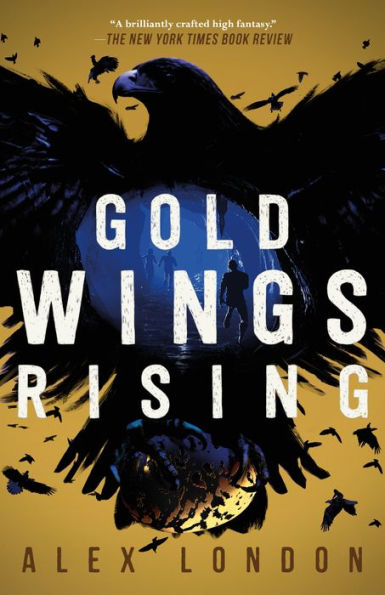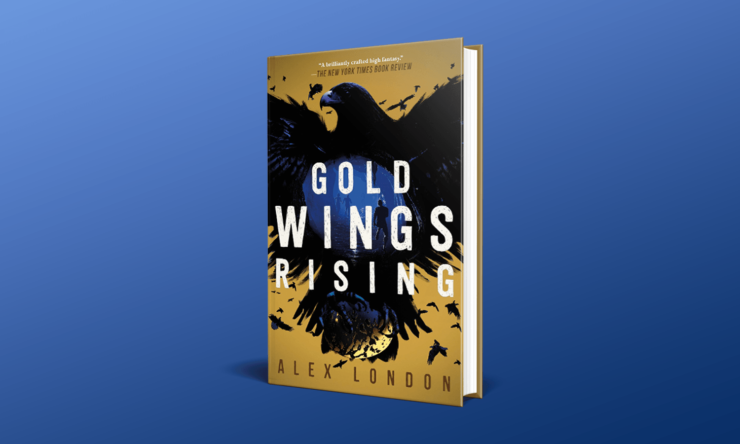The war with the sky has just begun…
We’re excited to share an excerpt from Gold Wings Rising, the final installment of Alex London’s Skybound Saga—publishing September 1st with Farrar, Straus & Giroux.
The war on the ground has ended, but the war with the sky has just begun. After the Siege of the Six Villages, the ghost eagles have trapped Uztaris on both sides of the conflict. The villagers and Kartami alike hide in caves, huddled in terror as they await nightly attacks. Kylee aims to plunge her arrows into each and every ghost eagle; in her mind, killing the birds is the only way to unshackle the city’s chains. But Brysen has other plans.
While the humans fly familiar circles around each other, the ghost eagles create schemes far greater and more terrible than either Kylee or Brysen could have imagined. Now, the tug-of-war between love and power begins to fray, threatening bonds of siblinghood and humanity alike.
An Old Song
They’d locked themselves inside cages built from the wreckage of the world.
The occupants of the Six Villages had strung up heavy netting to cut off any open sky, from roof to roof and fencepost to chimney, layers of nets and bars and beams sagging over streets and courtyards, casting patchwork shadows. They tied lines to the half-crumbled barricades—structures left over from a half-won battle they’d only half given up fighting— and looped the opposite ends on boulders. Every rope that once held a kite to a war barrow had been repurposed to create a shield between earth and sky.
As if the sky could be kept out by nets of rope and wire.
As if the sky hadn’t wanted this cage built in the first place.
As if a net could keep the sky from falling.
The ghost eagles did not know their own thoughts were anything other than the sky’s. They believed themselves the sky’s talons, the sky’s will, the only beings truly beloved by wind and air. They believed humanity was exactly where it was meant to be: cowering inside a cage. The ghost eagles believed they were winning.
The ghost eagles were right.
Buy the Book


Gold Wings Rising
When the ghost eagles flocked down from the high mountain peaks, the Sky Castle had sealed itself underneath nets and behind walls, cut off from its own army. No messages came in or out. Any stragglers on the plains or in the mountains or crossing the desert had been chased into shelters or torn to shreds. The Sky Castle took in no more frightened masses, closed its gates completely. Inside, the occupants were beginning to starve and, in desperation, beginning to riot.
The blood birch forest was quiet. None who entered left. The Owl Mothers had retreated, as they always did.
The ghost eagles attacked the Talon Fortress straightaway, leaving it abandoned and crumbling. They perched on the tops of its huge curved walls, which were shaped like talons breaking through the mountainside. They feasted on those who did not flee fast enough, and they built their eyrie from ruined stone and broken bones. This place had been theirs long ago, before the people, and now it was theirs once again. They perched by the hundreds and, from there, saw everything.
The flock of humanity scattered, and each settlement was its own cage, and each cage was all alone.
The ghost eagles ignored most of them but could never ignore the Six Villages. Through rage and hunger, the Six called them back, night after night after night, for reasons not even they could quite understand. The girl and her brother haunted their dreams. The ghost eagles saw memories, fragments of thought that were not their own, feelings so utterly human that they were incomprehensible to the convocation of ancient birds. They screeched back with their own voices, trying to chase out these thoughts that drew them, over and over, to the sky above the Six.
The once-broad main street of the Six Villages was clogged with tents and shacks, divided and subdivided into narrow twisting alleys and paths barely wider than a gull’s wings. Awnings protruded at odd angles, crossbeams cutting this way and that. The bent shells of war barrows capped alley entrances, forming arches over which the inhabitants strung their nets and ropes—anything they thought might impede an attack from above. Everything was built with a bird’s-eye view in mind.
What a person might consider laughter fluttered through the ghost eagles’ thoughts.
People had no idea what a bird’s-eye view entailed, nor what the eyes of these birds could see. One mind with a thousand eyes—they saw everything. They thought they saw everything.
In the Six, people fought over territory. Some lived in mountain caves just above the towns, stretched to the very limit of the nets’ reach. The nets were strongest wherever they met stone.
Fights broke out, houses changed hands, and violence in the narrow lanes was as common as cardinals scuffling with blue jays. Survivors of Kartami violence attacked ex-Kartami warriors—or people they believed to be ex-Kartami warriors. Kartami warriors not ready to give up their cause slaughtered Uztari soldiers in their sleep or slit the throats of the precious hawks and falcons they still viewed as blasphemous.
Then there was the violence born not of ideology or grievance but of survival: new gangs extorting people over food and water, gangs competing with each other after the collapse of the Tamir family’s control, freelance criminals, starved to the point of petty violence.
And, as in any society, there were people who loved violence simply for its own sake, who ran fighting rings with both bird and human bouts, who jumped anyone they didn’t like for any reason they could think up. There was too much ale and hunter’s leaf in town, and also too little. Supplies were starting to run low. Prices were soaring. Some people always found ways to profit from pain.
Kyrg Birgund, the nominal defense counselor of the Sky Castle, tried to maintain order, but there’d been little respect for the authority of kyrgs before the current calamity, and the situation hadn’t made anyone more respectful. Soon the soldiers would be hungry. Soon they would take what they needed from the people, who would, of course, fight back.
These were the thoughts that occupied the brother and sister, the thoughts the ghost eagles heard. The boy fretted. The girl plotted. The ghost eagles listened.
These human dramas played out in the crowded town during the day. Volunteers raced to patch tears in the nets, which the ghost eagles would then shred at night. It was endless maintenance. The people tired as they hungered.
The ghost eagles did not tire, though they did hunger as well. They could eat and eat, of course, but they would never be full. Want of meat was not what starved them. Still, at night, they ate.
Every morning the huddled multitudes of the Six Villages tried to mend their barriers against wrath from the predators above, and every night, from the moment the sixth star appeared in the sky until the first red light of dawn, those same predators came screeching down upon them.
People waited out the long nights with wax stuffed in their ears. At first the wax was for keeping out the ghost eagles’ cries, but it served a second purpose for the hard-hearted: not all the night’s shrieking came from ghost eagles.
Each morning, more people were found missing. The ghost eagles snared lifelong falconers of Uztar. They grabbed Altari Crawling Priests who’d never so much as looked at a bird of prey, let alone captured or trained one. They seized exKartami warriors stranded in the Six Villages after their army was crushed. They massacred Uztari foot soldiers and Uztari officers and Uztari traders and merchants and trappers and cooks. They took old and young, lovers and loners, sick and healthy—all forms of mind and body that the sky had ever seen. There was no discrimination. Death came for anyone unlucky enough to be caught.
Crowds gathered in the dawn sunshine each morning to breathe fresh air and share news about who had been taken in the night, how they had screamed, and what pieces of them might be found tangled in the web of ropes overhead. People placed bets on hands and limbs. The odds of a head were so low, a gambler would make a fortune if one were ever found.
The children sang new songs:
Fix the nets and tie your line
Or a ghost eagle will break your spine.Every night they shriek and cry.
Who will live and who will die?Me or you? You or I?
The eagle takes every-bod-die!
The last rhyme stretched thinner than the protective nets, but so it went with humanity. When happy, they sang; when sad, they sang; and when afraid, they sang. They were beings of song who knew well that song would not save them.
Sing on, rodents, sing on!
The ghost eagles had a song, too—an old, old song—and they’d sung it before and would sing it again. They sang this song every few generations, and it was always the same. They thought it would always be the same.
They wondered what might happen if it changed. They dared not wonder what might happen.
The song could never change.
The ghost eagles shrieked.
Excerpted from Gold Wings Rising, copyright © 2020 by Alex London.










